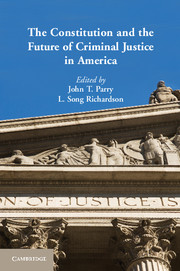Book contents
- Frontmatter
- Contents
- Contributors
- Acknowledgments
- Introduction
- Part I Foundations – The Scope of Criminal Law and Access to Counsel
- Part II Race and Criminal Procedure
- Part III Policing and Privacy
- Part IV Technology and the Surveillance Society
- Part V Confessions and miranda
- Part VI Conviction, Sentencing, and Incarceration
- Part VII Emergencies and Borders – Immigration, Terrorism, National Security, and Transnational Crime
- 14 Preemption and Proportionality in State and Local Crimmigration Law
- 15 Embattled Paradigms
- 16 The Civilianization of Military Jurisdiction
- 17 Crime across Borders
- Index
- References
15 - Embattled Paradigms
The “War on Terror” and the Criminal Justice System
Published online by Cambridge University Press: 05 June 2014
- Frontmatter
- Contents
- Contributors
- Acknowledgments
- Introduction
- Part I Foundations – The Scope of Criminal Law and Access to Counsel
- Part II Race and Criminal Procedure
- Part III Policing and Privacy
- Part IV Technology and the Surveillance Society
- Part V Confessions and miranda
- Part VI Conviction, Sentencing, and Incarceration
- Part VII Emergencies and Borders – Immigration, Terrorism, National Security, and Transnational Crime
- 14 Preemption and Proportionality in State and Local Crimmigration Law
- 15 Embattled Paradigms
- 16 The Civilianization of Military Jurisdiction
- 17 Crime across Borders
- Index
- References
Summary
Introduction
The post-9/11 “War on Terror” has profoundly challenged American criminal law in two very different ways. First, directing some suspected terrorists to a regime of military detention and military tribunal prosecutions for war crimes circumvents the criminal justice system altogether, making it easy to create a watered-down version of justice. But absorbing terrorism prosecutions of Guantánamo detainees and other suspected terrorists in the civilian courts also provokes the dilution of our accustomed criminal law and procedure guarantees for a group of defendants regarded as exceptional. And once accepted as legitimate, these exceptions and watered-down rights are positioned to become the new normal for all criminal defendants. While I believe that suspected terrorists should be treated as criminals rather than as soldiers in a metaphorical “war,” the widespread assumption that terrorism prosecutions are categorically unique has led us to a true Hobson’s choice: isolating prosecutions of foreign terrorism suspects to avoid compromising the civilian justice system or affording these suspects full due process in civilian courts with the understanding that the meaning of full due process is then likely to be altered.
Circumventing Criminal Justice
Beginning in the fall of 2001, President George W. Bush and later Congress proclaimed authority for the president to treat suspected terrorists as prisoners of war or war criminals rather than charging them with crimes in the civilian courts. Adoption of this “war” paradigm was based on the assumption that terrorism presents an inherently different challenge from crime. This paradigm shift resulted in the establishment of a law-free zone in Guantánamo, where suspects might be detained indefinitely without charges and might also be charged with war crimes before military tribunals that, from the outset, were designed not to follow the usual constitutional criminal trial norms. Indeed, the idea that a custom-designed model of what counts as due process might facilitate convictions was one of the chief attractions of the military venue.
- Type
- Chapter
- Information
- The Constitution and the Future of Criminal Justice in America , pp. 260 - 286Publisher: Cambridge University PressPrint publication year: 2013



